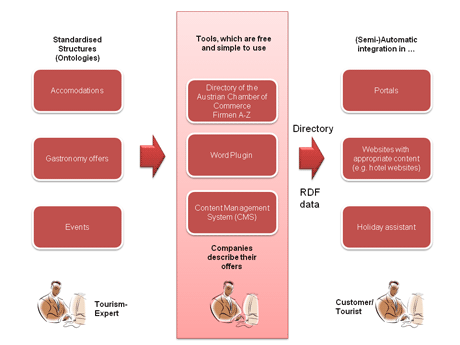by Bernd Gruber
Imagine that your computer could understand the kinds of data it handles and how to interlink them in an intelligent way: that is what the Semantic Web is all about. ebSemantics is establishing this innovative technology in the Austrian tourism industry to enable Web users to efficiently find relevant information on the Web.
The Federal Economic Chamber of Austria, the Austrian National Tourist Office, the e-business standardization initiative AUSTRIAPRO and Smart Information Systems are working together to create the prerequisites for taking advantage of e-commerce based on the Semantic Web. In particular, we foresee that the Semantic Web should be easily accessible by small and medium-sized businesses with few resources.
To reach this goal, entry barriers must be minimized. It is therefore part of this project to develop an infrastructure for the use of tourism businesses, as well as creating a demonstration tool to illustrate through practical examples the advantages of this technology. In addition, the project will provide best practise guides based on the experiences made in the use cases.
Currently, while conventional search engines are able to search for keywords on Web sites, only human users can read and interpret product and service information on the Web. The innovative technology used by the Semantic Web enables intelligent applications and search engines to grasp the meaning of the information, process this data and display it so that it is comprehensible to humans.
This 'next-generation Web' is currently in a developmental stage. ebSemantics is taking action to develop semantic technology for the Austrian economy.
So what is necessary to make the Semantic Web work for Austria's e-commerce?
First, there must be standardized structures, so-called ontologies, which should be easy to implement in various applications. To achieve this aim, Smart Information Systems and the University of Innsbruck are developing the collaborative wiki-based 'ontology development platform', myOntology.
Next, free and easy-to-use tools must be made available to everyone. An example of such a tool is the event platform OpenEvents, which publishes events on the Semantic Web. The Firmen A-Z (FAZ), a company register system that includes the basic data of more than 400,000 Austrian companies and is provided by the Austrian Federal Economic Chamber, is another way in which commercial offers and information can be advertised to the public. The FAZ is in fact one of the world's first Semantic Web-based directories that provides trusted authentication. In cooperation with Microsoft Austria, a Microsoft Word plug-in has been created to easily describe events and offers.

The final step is to interlink all the data, such as event information, catering offers and accommodation. As a result of this intelligent cross-linking between data, many diverse use cases occur. For example, a hotel Web site may contain information about relevant music events, or can link to a map containing restaurant locations. These events or restaurant offers can be customized so that, for example, only premium events are shown on a five-star hotel homepage or only cyclist-friendly restaurants are recommended along bicycle routes. In general, automatic and intelligent integration, combination and connection of offers is possible.
The design underlying the Semantic Web is very simple. Based on OWL (Web Ontology Language) files provided by the research platform myOntology, it is possible to create RDF (Resource Description Framework) files, which contain information about a service. OWL is a family of knowledge-representing languages for ontologies. RDF was originally designed as a metadata model. It developed into a general method for conceptual description or modelling of information, which is implemented in Web resources. Both RDF and OWL are families of World Wide Web Consortium (W3C) specifications.
Future activities will include dissemination work such as attending fairs and congresses. Support and information will be provided to small and medium-sized businesses, leading to approval of and demand for the Semantic Web and improving the chances of technology uptake.
Links:
http://www.ebsemantics.net (only available in German)
http://www.ebsemantics.net/doc/
Please contact:
Bernd Gruber
Smart Information Systems, Austria
Tel: +43 664 833 35 64
E-mail: b.gruber![]() smart-infosys.net
smart-infosys.net










